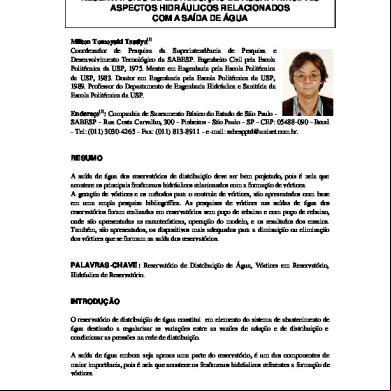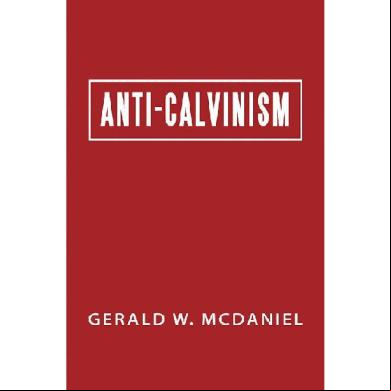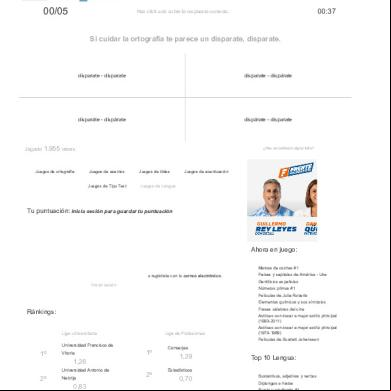Anti Chresis 6p501z
This document was ed by and they confirmed that they have the permission to share it. If you are author or own the copyright of this book, please report to us by using this report form. Report l4457
Overview 6h3y3j
& View Anti Chresis as PDF for free.
More details h6z72
- Words: 1,616
- Pages: 21
ANTICHRESIS (ARTICLES 2132-2139)
Definition of Antichresis
Art. 2132. By the contract of antichresis the creditor acquires the right to receive the fruits of an immovable of his debtor, with the obligation to apply them to the payment of the interest, if owing, and thereafter to the principal of his credit. (1881)
Characteristics of the contract Antichresis is: 1. an Accessory contract 2. a Formal contract 3. a Nominative contract 4. a Consensual contract
Delivery of property Antichresis requires the delivery by the debtor of the property given as security to the creditor. But such delivery is required only in order that the creditor may receive the fruits and not that the contract shall be binding. Note: The contract does not cover the immovable but only its fruits.
ANTICHRESIS
PLEDGE
Refers to the fruits of Real property
Personal property
Perfected by mere consent
Perfected by the delivery of the thing pledged
Consensual contract
Real contract
• Both are similar in that the debtor loses control of the subject matter of the contract
ANTICHRESIS and REAL MORTGAGE compared 1. In Antichresis, the property is delivered to the creditor, while in mortgage, the debtor usually retains possession of the property; 2. In Antichresis, the creditor acquires only the right to receive the fruits of the property; hence, it does not produce a real right, while in mortgage, the creditor does not have any right to receive the fruits, but the mortgage creates a real right over the property which is enforceable against the whole world;
3. In antichresis, the creditor, unless there is a stipulation to the contrary, is obliged to pay the taxes and charges Upon the estate (Art. 2135.), while in mortgage, the creditor has no such obligation; 4. In antichresis, it is expressly stipulated that the creditor given possession of the property shall apply the fruits thereof to the payment of interest, if owing, and thereafter to the principal of the credit, while in a mortgage, there is no such obligation on the part of the mortgagee.
• Both are similar in that the subject matter is real property. Like pledge and mortgage, antichresis gives a real and not merely a personal right if it is ed in the Registry of Property.
ART. 2133. The actual market value of the fruits at the time of the application thereof to the interest and principal shall be the measure of such application.
ART. 2134. The amount of the principal and of the interest shall be specified in writing; otherwise, the contract of antichresis shall be void.
ART. 2135. The creditor, unless there is a stipulation to the contrary, is obliged to pay the taxes and charges upon the estate. He is also bound to bear the expenses necessary for its preservation and repair. The sums spent for the purposes stated in this article shall be deducted from the fruits.
Obligations of the antichretic creditor. 1. Payment of taxes and charges upon the estate. If he does not pay the taxes, he is by law required to pay indemnity for damages to the debtor. Where the debtor has paid for the taxes on the property which the creditor should have paid, the amount is to be applied to the payment of the debt, the debtor is entitled to return of the property free from all encumbrances if he, in effect, by advancing the taxes, had already discharge the debt. 2. Application of the fruits of the estate.
ART. 2136. The debtor cannot reacquire the enjoyment of the immovable without first having totally paid what he owes the creditor. But the latter, in order to exempt himself from the obligations imposed upon him by the preceding article, may always compel the debtor to enter again upon the enjoyment of the property, except when there is a stipulation to the contrary. Right of antichretic debtor to reacquire enjoyment of property The property delivered stands as a security for the payment of the obligation of the debtor in antichresis. Hence, the debtor cannot demand its return until the debt is totally paid.
However, if the creditor does not want to pay the taxes and incur the expenses necessary for the preservation and repair of the property (Art. 2135), he may compel the debtor to reacquire the enjoyment of the same except when there is a contrary stipulation. (Art. 2136).
ART. 2137. The creditor does not acquire the ownership of the real estate for nonpayment of the debt within the period agreed upon. Every stipulation to the contrary shall be void. But the creditor may petition the court for the payment of the debt or the sale of the real property. In this case, the Rules of Court on the foreclosure of mortgages shall apply. Remedy of creditor in case of nonpayment of debt (1)
to bring an action for specific performance; or (2) to petition for the sale of the real property as in a foreclosure of mortgages under Rule 68 of the Rules of Court.
The parties, however, may agree on an extrajudicial foreclosure in the same manner as they are allowed in contracts of mortgage and pledge.
Acquisition by creditor of property by prescription. The creditor in antichresis and his successors-in-interest cannot ordinarily acquire by prescription the land given to him, any agreement to the contrary being void.(Valencia v. Alcala)
Q: Is the prescription as a mode of acquiring ownership available to the creditor in antichresis?
A: NO. His possession of the property is not in the concept of an owner but that of a mere holder during the existence of the contract. (Ramirez v. CA)
ART. 2138. The contracting parties may stipulate that the interest upon the debt be compensated with the fruits of the property which is the object of the antichresis, provided that if the value of the fruits should exceed the amount of interest allowed by the laws against usury, the excess shall be applied to the principal. Interest in antichresis subject to the Usury Law Note: The rate of interest on loan or forbearance of money, goods, or credit is no longer subject to any ceiling prescribed under the Usury Law.
ART. 2139. The last paragraph of Article 2085, and Articles 2089 to 2091 are applicable to this contract. Applicability of certain articles. Art. 2085. The following requisites are essential to the contracts of pledge and mortgage: (1) That they be constituted to secure the fulfillment of a principal obligation; (2) That the pledgor or mortgagor be the absolute owner of the thing pledged or mortgaged; (3) That the persons constituting the pledge or mortgage have the free disposal of their property, and in the absence thereof, that they be legally authorized for the purpose. Third persons who are not parties to the principal obligation may secure the latter by pledging or mortgaging their own property.
Art. 2089. A pledge or mortgage is indivisible, even though the debt may be divided among the successors in interest of the debtor or of the creditor. Therefore, the debtor’s heir who has paid a part of the debt cannot ask for the proportionate extinguishment of the pledge or mortgage as long as the debt is not completely satisfied. Neither can the creditor’s heir who received his share of the debt return the pledge or cancel the mortgage, to the prejudice of the other heirs who have not been paid. From these provisions is expected the case in which, there being several things given in mortgage or pledge, each one of them guarantees only a determinate portion of the credit. The debtor, in this case, shall have a right to the extinguishment of the pledge or mortgage as the portion of the debt for which each thing is specially answerable is satisfied.
Art. 2091. The contract of pledge or mortgage may secure all kinds of obligations, be they pure or subject to a suspensive or resolutory condition. (1861)
Olivia owns a vast of mango plantation which she can no longer properly manage due to a lingering illness. Since she is indebted to Peter in the amount of 500.000.00 she asks Peter to manage the plantation and apply the harvest to the payment of her obligation to him, principal and interest, until her indebtedness shall have been fully paid. Peter agrees.
Q: What kind of contract is entered into by Olivia and Peter? A contract of Antichresis was entered into by the parties. Under Art. 2132 of the New Civil Code, by a contract of Antichresis the creditor acquires the right to receive the fruits of an immovable of his debtor, with the obligation to apply them to the to the payment of the interest, and thereafter to the principal of his credit.
2. What specific obligations are imposed by law on Peter as a consequence of their contract? A: Peter must pay taxes and charges upon the land and bear the necessary expenses for the preservation and repair which he may deduct from the fruits. (Art.2315,NCC) 3. Does the law requires any specific form for the validity of their contract? A: The amount of the principal and the interest must be specified in writing, otherwise the antichresis will be void.
4. May Olivia re-acquire the plantation before her entire indebtedness shall have been fully paid? NO. Art. 2136 specifically provides that the debtor can not re- acquire the immovable with out first having totally paid what he owes the creditor. However, it is potestative on the part of the creditor to do so in order to exempt him from his obligation under Art. 2135, NCC. The debtor cannot re-acquire the enjoyment unless Peter compels Olivia to enter again the enjoyment of the property.
Definition of Antichresis
Art. 2132. By the contract of antichresis the creditor acquires the right to receive the fruits of an immovable of his debtor, with the obligation to apply them to the payment of the interest, if owing, and thereafter to the principal of his credit. (1881)
Characteristics of the contract Antichresis is: 1. an Accessory contract 2. a Formal contract 3. a Nominative contract 4. a Consensual contract
Delivery of property Antichresis requires the delivery by the debtor of the property given as security to the creditor. But such delivery is required only in order that the creditor may receive the fruits and not that the contract shall be binding. Note: The contract does not cover the immovable but only its fruits.
ANTICHRESIS
PLEDGE
Refers to the fruits of Real property
Personal property
Perfected by mere consent
Perfected by the delivery of the thing pledged
Consensual contract
Real contract
• Both are similar in that the debtor loses control of the subject matter of the contract
ANTICHRESIS and REAL MORTGAGE compared 1. In Antichresis, the property is delivered to the creditor, while in mortgage, the debtor usually retains possession of the property; 2. In Antichresis, the creditor acquires only the right to receive the fruits of the property; hence, it does not produce a real right, while in mortgage, the creditor does not have any right to receive the fruits, but the mortgage creates a real right over the property which is enforceable against the whole world;
3. In antichresis, the creditor, unless there is a stipulation to the contrary, is obliged to pay the taxes and charges Upon the estate (Art. 2135.), while in mortgage, the creditor has no such obligation; 4. In antichresis, it is expressly stipulated that the creditor given possession of the property shall apply the fruits thereof to the payment of interest, if owing, and thereafter to the principal of the credit, while in a mortgage, there is no such obligation on the part of the mortgagee.
• Both are similar in that the subject matter is real property. Like pledge and mortgage, antichresis gives a real and not merely a personal right if it is ed in the Registry of Property.
ART. 2133. The actual market value of the fruits at the time of the application thereof to the interest and principal shall be the measure of such application.
ART. 2134. The amount of the principal and of the interest shall be specified in writing; otherwise, the contract of antichresis shall be void.
ART. 2135. The creditor, unless there is a stipulation to the contrary, is obliged to pay the taxes and charges upon the estate. He is also bound to bear the expenses necessary for its preservation and repair. The sums spent for the purposes stated in this article shall be deducted from the fruits.
Obligations of the antichretic creditor. 1. Payment of taxes and charges upon the estate. If he does not pay the taxes, he is by law required to pay indemnity for damages to the debtor. Where the debtor has paid for the taxes on the property which the creditor should have paid, the amount is to be applied to the payment of the debt, the debtor is entitled to return of the property free from all encumbrances if he, in effect, by advancing the taxes, had already discharge the debt. 2. Application of the fruits of the estate.
ART. 2136. The debtor cannot reacquire the enjoyment of the immovable without first having totally paid what he owes the creditor. But the latter, in order to exempt himself from the obligations imposed upon him by the preceding article, may always compel the debtor to enter again upon the enjoyment of the property, except when there is a stipulation to the contrary. Right of antichretic debtor to reacquire enjoyment of property The property delivered stands as a security for the payment of the obligation of the debtor in antichresis. Hence, the debtor cannot demand its return until the debt is totally paid.
However, if the creditor does not want to pay the taxes and incur the expenses necessary for the preservation and repair of the property (Art. 2135), he may compel the debtor to reacquire the enjoyment of the same except when there is a contrary stipulation. (Art. 2136).
ART. 2137. The creditor does not acquire the ownership of the real estate for nonpayment of the debt within the period agreed upon. Every stipulation to the contrary shall be void. But the creditor may petition the court for the payment of the debt or the sale of the real property. In this case, the Rules of Court on the foreclosure of mortgages shall apply. Remedy of creditor in case of nonpayment of debt (1)
to bring an action for specific performance; or (2) to petition for the sale of the real property as in a foreclosure of mortgages under Rule 68 of the Rules of Court.
The parties, however, may agree on an extrajudicial foreclosure in the same manner as they are allowed in contracts of mortgage and pledge.
Acquisition by creditor of property by prescription. The creditor in antichresis and his successors-in-interest cannot ordinarily acquire by prescription the land given to him, any agreement to the contrary being void.(Valencia v. Alcala)
Q: Is the prescription as a mode of acquiring ownership available to the creditor in antichresis?
A: NO. His possession of the property is not in the concept of an owner but that of a mere holder during the existence of the contract. (Ramirez v. CA)
ART. 2138. The contracting parties may stipulate that the interest upon the debt be compensated with the fruits of the property which is the object of the antichresis, provided that if the value of the fruits should exceed the amount of interest allowed by the laws against usury, the excess shall be applied to the principal. Interest in antichresis subject to the Usury Law Note: The rate of interest on loan or forbearance of money, goods, or credit is no longer subject to any ceiling prescribed under the Usury Law.
ART. 2139. The last paragraph of Article 2085, and Articles 2089 to 2091 are applicable to this contract. Applicability of certain articles. Art. 2085. The following requisites are essential to the contracts of pledge and mortgage: (1) That they be constituted to secure the fulfillment of a principal obligation; (2) That the pledgor or mortgagor be the absolute owner of the thing pledged or mortgaged; (3) That the persons constituting the pledge or mortgage have the free disposal of their property, and in the absence thereof, that they be legally authorized for the purpose. Third persons who are not parties to the principal obligation may secure the latter by pledging or mortgaging their own property.
Art. 2089. A pledge or mortgage is indivisible, even though the debt may be divided among the successors in interest of the debtor or of the creditor. Therefore, the debtor’s heir who has paid a part of the debt cannot ask for the proportionate extinguishment of the pledge or mortgage as long as the debt is not completely satisfied. Neither can the creditor’s heir who received his share of the debt return the pledge or cancel the mortgage, to the prejudice of the other heirs who have not been paid. From these provisions is expected the case in which, there being several things given in mortgage or pledge, each one of them guarantees only a determinate portion of the credit. The debtor, in this case, shall have a right to the extinguishment of the pledge or mortgage as the portion of the debt for which each thing is specially answerable is satisfied.
Art. 2091. The contract of pledge or mortgage may secure all kinds of obligations, be they pure or subject to a suspensive or resolutory condition. (1861)
Olivia owns a vast of mango plantation which she can no longer properly manage due to a lingering illness. Since she is indebted to Peter in the amount of 500.000.00 she asks Peter to manage the plantation and apply the harvest to the payment of her obligation to him, principal and interest, until her indebtedness shall have been fully paid. Peter agrees.
Q: What kind of contract is entered into by Olivia and Peter? A contract of Antichresis was entered into by the parties. Under Art. 2132 of the New Civil Code, by a contract of Antichresis the creditor acquires the right to receive the fruits of an immovable of his debtor, with the obligation to apply them to the to the payment of the interest, and thereafter to the principal of his credit.
2. What specific obligations are imposed by law on Peter as a consequence of their contract? A: Peter must pay taxes and charges upon the land and bear the necessary expenses for the preservation and repair which he may deduct from the fruits. (Art.2315,NCC) 3. Does the law requires any specific form for the validity of their contract? A: The amount of the principal and the interest must be specified in writing, otherwise the antichresis will be void.
4. May Olivia re-acquire the plantation before her entire indebtedness shall have been fully paid? NO. Art. 2136 specifically provides that the debtor can not re- acquire the immovable with out first having totally paid what he owes the creditor. However, it is potestative on the part of the creditor to do so in order to exempt him from his obligation under Art. 2135, NCC. The debtor cannot re-acquire the enjoyment unless Peter compels Olivia to enter again the enjoyment of the property.










